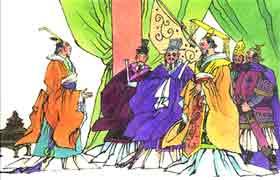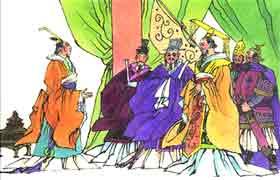相關信息
 發 音 hòu lái jū shàng
發 音 hòu lái jū shàng 釋 義 居:處於。後來的超過先前的。有以稱讚後起之秀超過前輩。
出 處 西漢·司馬遷《史記·汲鄭列傳》汲黯對漢武帝說:“陛下用群臣,如積薪耳,後來者居上。”
示 例 今老矣,樂不預少年文酒之會,~,又不知其為誰?(清·紀昀《閱微草堂筆記》卷二十四)
用 法 主謂式;作謂語、定語;指後者勝前者
近義詞 青出於藍
反義詞 一代不如一代
歇後語 刀茅變槍炮
燈 謎 砌牆;迭羅漢;一樓客滿;武則天稱帝
【典故】
漢武帝時,朝中有3位有名的臣子,分別叫作汲黯、公孫弘和張湯。這3個人雖然同時在漢武帝手下為臣,但他們的情況卻很不一樣。汲黯進京供職時,資歷已經很深且官職也已經很高了,而當時的公孫弘和張湯兩個人還只不過是個小官,職位低得很。可是由於他們為人處事恰到好處,加上政績顯著,因此,公孫弘和張湯都一步一步地被提拔起來,直到公孫弘封了侯又拜為相國,張湯也升到了御史大夫,兩人官職都排在汲黯之上了。
汲黯這個人原本就業績不及公孫弘、張湯,可他又偏偏心胸狹窄,眼看那兩位過去遠在自己之下的小官都已官居高位,心裡很不服氣,總想要找個機會跟皇帝評評這個理。
有一天散朝後,文武大臣們陸續退去,漢武帝慢步踱出宮,正朝著通往御花園的花徑走去。汲黯趕緊趨步上前,對漢武帝說:“陛下,有句話想說給您聽,不知是否感興趣?”
漢武帝回過身停下,說:“不知是何事,不妨說來聽聽。”
汲黯說:“皇上您見過農人堆積柴草嗎?他們總是把先搬來的柴草鋪在底層,後搬來的反而放在上面,您不覺得那先搬來的柴草太委屈了嗎?”
漢武帝有些不解地看著汲黯說:“你說這些,是什麼意思呢?”
汲黯說:“你看,公孫弘、張湯那些小官,論資歷論基礎都在我之後,可現在他們卻一個個後來居上,職位都比我高多了,皇上您提拔官吏不是正和那堆放柴草的農人一樣嗎?”
幾句話說得漢武帝很不高興,他覺得汲黯如此簡單、片面地看問題,是不通情理的。他本想貶斥汲黯,可又想到汲黯是位老臣,便只好壓住火氣,什麼也沒說,拂袖而去。此後,漢武帝對汲黯更是置之不理,他的官職也只好原地踏步了。
後來者居上,原本是客觀事物的發展規律,這就要看我們從哪個角度來看這個問題了。汲黯認為提拔人才一定要論資排輩,反對後來居上,是不可取的。
汲黯是西漢武帝時代人,以剛直正義、敢講真話而受人尊重。他為人和做官都不拘小節,講求實效。雖然表面上不那么轟轟烈烈,卻能把一個郡治理得井井有條,因此,朝廷把他從東海太守調到朝廷當主爵都尉——一種主管地方吏任免的官職。
有一次,漢武帝說要實行儒家的仁義之政,為老百姓辦好事了。沒等皇帝把話說完,汲黯就說:“陛下內心裡那么貪婪多欲,表面上卻要裝得實行仁政,這是何苦呢?”一句話把皇帝噎了回去。漢武帝登時臉色大變,宣布罷朝,滿朝文武都為汲黯捏著一把汗,擔心他會因此招來大禍。武帝回到宮裡以後,對身邊的人說,汲黯這個人也未免太粗太直了。
從此以後,汲黯的官職再也沒有提升。他當主爵都尉的時候,公孫弘、張湯都還是不起眼的小官,後來,他們一個勁兒住上升,公孫弘當上了丞相,張湯做上了御史大夫,可他汲黯還蹲在原地沒動窩。有一天,汲黯對武帝說,陛下使用群臣,跟碼劈柴一樣,是“後來者居上”啊!漢武帝當然聽得出這是發牢騷。於是,轉臉對臣下們說:“人真是不能不學習啊!你們聽汲黯說話,越來越離譜了!”
故事出自《史記·汲鄭列傳》。成語“後來居上”,往往指後起的可以勝過先前的。和汲黯說這話的原意,大不相同。
【英譯】The Latecomers Surpass the Old-timers
This set phrase is derived from the complaints Ji An made to the emperor.
Ji Anlived at the time of Emperor Wudi of the Western Han Dynasty (206 B.C.-A.D.24). He was respected for being upright and just and for daring to speak the truth. He did not bother about amall matters in personal behaviour and in being an official. He was particular about actual effects and ,although he did not cause a stir ,he could keep the prefecture he governed in perfect order. Because of this. the imperial court transferred him to the central government from being the perfect of the Donghai Prefecture to being a commander in charge of the appointment and dismissal of the local officals.
Once,Emperor Wudi said that he would implement the policy of benevolence and justice of Confucianism and would do good turns to the people.Emperor Wudi Had hardly finished his remards when Ji An said that there was no need for the emperor to say so.Why should the emperor bother,Ji An said, about pretending to implement the policy of benevolence and justice since he was so greedy and avaricious within himself? This choked the emperor off. The emperor suddenly Changed his countenance and declared the meeting over. All the civilian and military officers at court were breathless with anxiety for fear that Ji An might bring disaster upon himself because of this. After returning, Emperor Wudi said to the people around him that Ji An was a little too rude and too straightforward.
For this reason ,Ji An was never promoted again. When he was the commander in charge of the appointment and dismissal of the local officials, both Gongsun Hong and Zhang Tang were low -ranking lfficials of little importance. Later ,they were promoted continuously. Gongsun Hong became the prime minister and Zhang Tang became the imperial censor. However, JiAn's post remained thesame. One day, Ji An said to Emperor Wudi that the way the emperor used his ministers was just like piling up firewood, which meant that the latecomers surpassed the old-timers. Of course, Emperor Wudi could see that Ji An was complaining. So,turning to his ministers, Emperor Wudi said, "It is true that no one can stop learning.You see, Ji An is making more and more indiscreet remarks."
This story comes from The Historical Records. Later generations use the set phrase "the latecomers surpass the old-timers " to indicate that successors can cxcel the predecessors, which is quite different from the original idea when Ji An said that the latecomers surpassed the old-timers.

